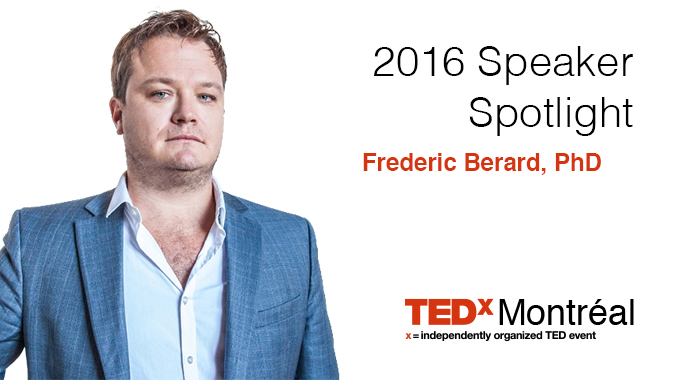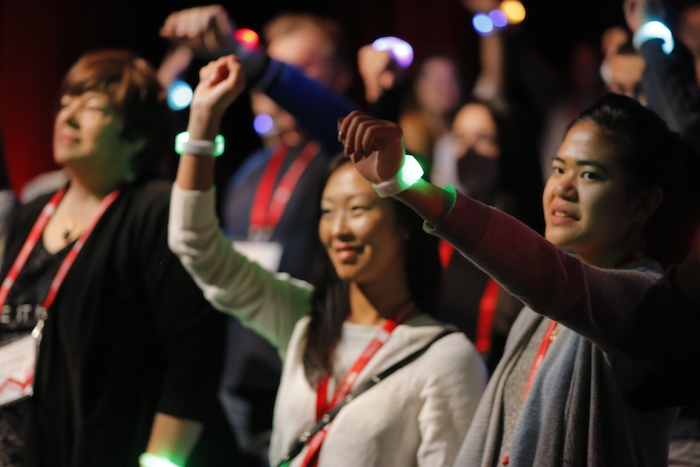2016 Speaker Line Up!
by Catherine Brosseau
We’re happy to announce our speaker line-up for TEDxMontreal 2016! We’re so excited by the talks planned this year and we’re sure you will be too. Here’s a sneak peek:
Alex Parker:
As an associate professor in the department of neuroscience and researcher at the Centre Hospitalier de l’Université de Montréal, Alex Parker and his team are working to find new ways to combat neurodegenerative diseases like ALS and dementia. To do this they have enlisted the help of a common worm, C. elegans, to make miniature models of these terrible diseases. A. Parker and collaborators have discovered new ways to cure these animals that may help patients.
Alexis Charpentier:
Alexis Charpentier is the founder of the Music Is My Sanctuary website, dedicated to the discovery and sharing of “Forgotten Treasures & Future Classics”. Established in 2007, it is now a highly influential and trusted source for the more adventurous music lovers worldwide. “MIMS” has also introduced side projects like the 24 Hours of Vinyl event series, an artist agency, regular events and weekly radio sessions in partnership with the Phi Centre. For the past 15 years, Alexis has been a pillar of the Montreal scene as a DJ (Lexis) and event organizer. He also tours for worldwide shows and festivals.
Amir Raz:
Professor Amir Raz is the Canada Research Chair in the Faculty of Medicine at McGill University, Professor in the Departments of Psychiatry, Neurology & Neurosurgery, and Psychology, and Senior Investigator in the Lady Davis Institute for Medical Research of the Jewish General Hospital, and a member of the Montreal Neurological Institute in Montreal, Canada. As Canada Research Chair in the Cognitive Neuroscience of Attention, he heads both the Cognitive Neuroscience Laboratory at McGill University and the Clinical Neuroscience and Applied Cognition Laboratory at the Institute for Community and Family Psychiatry. Dr. Raz is a leader in unlocking the brain substrates of attention and consciousness. Founding Editor-in- Chief of the Journal of Mind-Body Regulation, he is the academic protégé of the legendary Michael Posner, and a former member of the McGill Board of Governors.
Frédéric Berard:
Me Frédéric Bérard, constitutionnalist and political scientist, is Co-Director of the National Observatory on Language Rights as well as lecturer at the Université de Montréal (UdeM) and McGill University. He is the author of the bestselling book “La fin de l’État de droit? (Coup de coeur Renaud-Bray, Gaspard prize list) and co-author of “Précis d’interprétation législative et de l’essai Droit à l’indépendance (booksellers prize, Gaspard prize list). He is, according to the Revue des libraires, one of the « 10 essayists under 40 that is transforming Quebec ». Me Bérard is a septuple recipient of the André-Morel professoral excellence prize (UdeM), as well as recipient of the excellence in teaching prize – doctoral and postdoctoral lecturing (UdeM) and of the Excellence in teaching award (McGill). He is a partner and legal-councillor with the Lex Operandi legal firm, and has recently defended his doctoral thesis in constitutional law, with a unanimous mention of excellence and recommendation to the dean’s honor list.
Graham Calder:
Graham Calder’s formative years on a farm instilled in him a lasting devotion to ecological preservation. Dissatisfied with mainstream environmentalism, Calder gravitated towards the holistic approaches of permaculture, and the broad spectrum of solutions it proposes. In 2009 Calder received a Bachelor’s of Geography and Ecology from Concordia University, and completed his Permaculture Design Certification (PDC) at Pacific Permaculture. Later that year he apprenticed under Geoff Lawton at the Permaculture Research Institute of Australia, where he completed certifications in Earthworks and Permaculture Teaching. In 2009 Calder founded P3 Permaculture: a social enterprise seeking to make permaculture accessible. P3 Permaculture provides permaculture courses and design consultation in Eastern Canada.
Lisbet Haglund:
Lisbet Haglund is a scientist and holds a position of Associate Professor in the division of Orthopaedics at McGill University. Her research focus is on understanding how back pain arises and how it can be prevented. Lisbet is part of a multidisciplinary team of basic scientists, engineers and spine surgeons; a critical combination to address all aspects of this condition. They have together developed bioreactors where live human tissue can be maintained in an environment mimicking that found in the body. This system opens endless possibilities to learn more about how back pain occurs, and provides a platform to evaluate potential treatment strategies.
Margaret Magdesian:
Dr Margaret Magdesian is a neuroscientist studying the mechanism of neuronal degeneration and repair. In collaboration with the Montreal Neurological Institute and the McGill University Department of Physics, she developed a new technique to reconnect neurons 60 times faster than previously reported. In the future, similar techniques may even allow surgeons to reestablish connections after injury. Dr Magdesian’s innovation is one of the latest in the organ-on-a-chip movement, which has the potential to dramatically accelerate biopharmaceutical research. Recently, Dr Magdesian launched a company called ANANDA Devices (www.AnandaDevices.com) to extend the use of the developed devices and techniques to other fields in medicine.
Philippe Demers:
Philippe Demers follows one principle in all events and brand strategies he develops: the creation of value via art. As an entrepreneur and visionary, Mr. Demers created MASSIVart in 2009, a team of passionate folks who connect artists and companies who share a common vision for artistic content. As the founder of the Chromatic Art Festival, now in its 7th year, he develops opportunities for the public and the arts to meet, and to do so in an immersive experience. Over the years, the festival has gathered over 70,000 people from Montreal, Paris and Toronto, and has included over 500 artists.
Pierre-Majorique Léger:
Professor Pierre-Majorique Léger is a researcher, inventor and entrepreneur. His research seeks to improve the user experience while learning or using technology. He does this by analyzing massive amounts of bio-physiological data that are generated during human-IT interactions, which allow him to qualify emotion and cognitive responses in users. He is a professor of IT at HEC Montreal, as well as invited professor at the prestigious Tuck School of Business, Dartmouth College and the Henry B. Tippe School of Management at the University of Iowa. He is the author of over 50 scientific articles, he holds at least 10 invention patents and has also been involved with several start-ups.
Stéphanie Alyson Gravel:
My name is Stéphanie Alyson Gravel: transgender woman. How can I be described? Intellectual without a diploma? Specialist without a specific expertise? In my case, it’s virtually impossible to assign titles; I see ideas as blocks of materials first and foremost, from which we can bring forth solutions. I’ve been through many walks of life: ex-military, restaurant employee, IT specialist, electrical apprentice, construction worker, blogger, board member, conference keynote speaker and many more. Throughout these roles, many people develop their unique ways to view the world. I’d like to share mine.
Susan Wener:
Susan Wener had a happy marriage, three daughters and the grace of Audrey Hepburn. Then, she received the first cancer diagnosis, heralding a battle that began with one goal – to see her children finish high school. With dismal odds of surviving her second cancer, Susan had one lung removed and refused chemo-therapy. Twenty years later and cancer-free, she released her memoir, Resilience, which became an overnight Canadian best seller. Susan is a therapist for people struggling with life-threatening illness. Susan sits on the Gynecological Oncology Tumor Board at the Montreal Jewish General Hospital. She is the proud grandmother of nine.
Yoshua Bengio:
Head of the Montreal Institute for Learning Algorithms (MILA) and Professor at U. Montreal, Yoshua Bengio is one of the pioneers of Deep Learning and member of the NIPS board. With a PhD from McGill University (1991, Computer Science) and postdocs at MIT and AT&T Bell Labs, he holds the Canada Research Chair in Statistical Learning Algorithms, is a Senior Fellow of the Canadian Institute for Advanced Research and co-directs its program focused on deep learning. He is best known for his contributions to deep learning, recurrent nets, neural language models, neural machine translation and biologically inspired machine learning.

